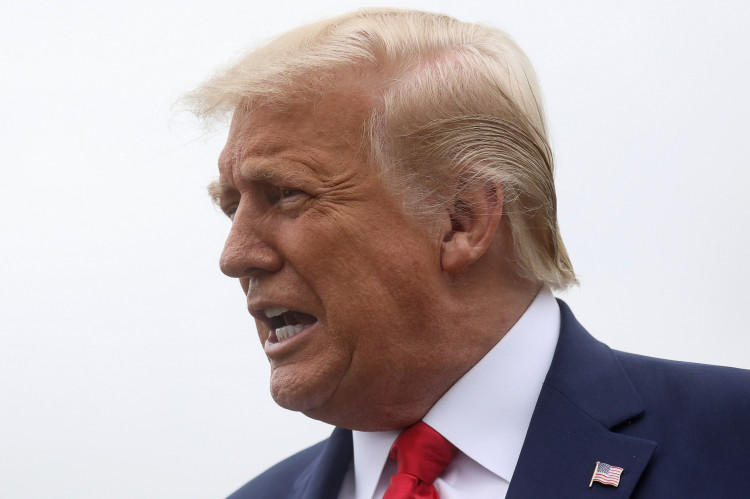A federal judge on Monday sharply questioned the Trump administration's compliance with his court order after deportation flights carrying Venezuelan migrants to El Salvador proceeded despite his verbal directive to halt them. Chief U.S. District Judge James E. Boasberg expressed skepticism over the administration's argument that his oral instructions lacked binding authority, raising the stakes in an already contentious legal battle over President Donald Trump's use of wartime powers to expedite deportations.
Boasberg appeared incredulous as Deputy Associate Attorney General Abhishek Kambli contended that only the judge's subsequent written order, issued approximately 45 minutes after the verbal instruction, carried legal force. "You felt that you could disregard it because it wasn't in the written order. That's your first argument? The idea that because my written order was pithier so it could be disregarded, that's one heck of a stretch," Boasberg said.
The dispute centers on Trump's recent invocation of the 1798 Alien Enemies Act, a rarely used statute historically reserved for times of declared war. The administration's weekend move applied the law to deport Venezuelans over age 14 allegedly tied to the Tren de Aragua gang, without providing the usual due process protections. Plaintiffs, represented by the American Civil Liberties Union (ACLU) and Democracy Forward, argue the act's use in this context is unconstitutional and improperly targets noncitizens without proof of gang affiliation.
Boasberg issued a temporary restraining order Saturday night blocking the deportation of several Venezuelans and extended the injunction to cover all migrants being deported under the Alien Enemies Act. During an emergency hearing, the judge verbally instructed the administration to notify relevant officials immediately that any planes carrying these individuals either preparing for departure or already airborne should return to the U.S.
According to court filings, two flights had already left a Texas detention facility before Boasberg's written order was formally issued at 7:26 p.m. Eastern time. Both planes continued to El Salvador. A third flight departed after the hearing and reportedly carried no migrants deported under the contested act.
The Trump administration maintains it complied with the court's written directive. "Oral statements are not injunctions and the written orders always supersede whatever may have been stated in the record," Kambli told the court.
Boasberg dismissed the suggestion that his authority ceased when the planes exited U.S. airspace. "I'm just asking how you think my equitable powers do not attach to a plane that has departed the U.S., even if it's in international airspace," he said. "The problem is the equitable power of United States courts is not so limited."
At Monday's hearing, Kambli repeatedly cited national security concerns as the reason the Justice Department declined to disclose details about the deportation flights, including precise takeoff times and passenger counts. He argued that sensitive coordination with foreign governments prevented providing further information, even to the judge in a sealed proceeding. Boasberg ordered the administration to submit additional details by noon Tuesday, rejecting the government's request to cancel the hearing altogether.
The legal confrontation has triggered international repercussions. El Salvador's President Nayib Bukele posted on social media Sunday morning, "Oopsie... too late," alongside a news article referencing Boasberg's order, confirming more than 200 deportees had already arrived and been transferred to a high-security prison.
White House communications director Steven Cheung reposted Bukele's message with an approving GIF. Later Sunday, Axios reported anonymous Trump officials had decided to proceed with deportations, reasoning that Boasberg's directive did not apply to planes outside U.S. jurisdiction.
White House press secretary Karoline Leavitt denied defying the order, stating, "The administration did not 'refuse to comply' with a court order." Separately, White House "border czar" Tom Homan appeared to dismiss the legal process altogether, telling Fox News, "I don't care what the judges think."
The ACLU's lead attorney, Lee Gelernt, warned during Monday's hearing that the administration's actions risked a constitutional showdown. "There's been a lot of talk about constitutional crisis, people throw that word around. I think we're getting very close to it," Gelernt said. He indicated the ACLU would request that the judge compel the administration to return all deported individuals to the U.S.
Boasberg, acknowledging the administration's apparent reluctance to abide by verbal directives, stated he would document the proceedings more formally moving forward. "I will memorialize this in a written order since apparently my oral orders don't seem to carry much weight," he remarked.
Trump's use of the Alien Enemies Act-invoked only three times in U.S. history, all during congressionally declared wars-has fueled debate over executive power. His recent proclamation designates the Tren de Aragua gang as a national security threat, labeling it a "hybrid criminal state" aligned with Venezuela.
Venezuela's government on Monday denounced the deportations, with chief negotiator Jorge Rodriguez calling the transfers "kidnappings" and vowing to challenge them as "crimes against humanity" at the United Nations. "They are not detaining them, they are kidnapping them and expelling them," Rodriguez said.
Families of Venezuelan migrants scrambled over the weekend to locate loved ones, with several immigration lawyers reporting clients removed without formal gang allegations. Martin Rosenow, representing Franco Caraballo, said his client was detained during a routine check-in despite lacking any criminal charges. Caraballo's wife believes a tattoo marking their daughter's birthday led to his wrongful classification. "I've never seen anything like this," Rosenow said.
Boasberg's temporary restraining order is scheduled to remain in effect for up to 14 days as litigation unfolds. He set another hearing for Friday but indicated the administration would be required to provide a sworn declaration detailing the weekend's deportation flights.






